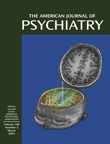Pregabalin in Generalized Anxiety Disorder: A Placebo-Controlled Trial
Abstract
OBJECTIVE: Current drug therapies for generalized anxiety disorder have limitations. In a controlled trial, the novel agent pregabalin was studied for the treatment of patients with generalized anxiety disorder. METHOD: In this double-blind study, patients with DSM-IV generalized anxiety disorder were randomly assigned to receive pregabalin (150 mg/day or 600 mg/day), lorazepam (6 mg/day), or placebo. A 1-week placebo lead-in was followed by 4 weeks of treatment and then a 1-week dose taper. The primary efficacy measure was the Hamilton Anxiety Rating Scale score at endpoint. RESULTS: A total of 276 patients were randomly assigned to a treatment group and received at least one dose of their assigned medication. Fewer patients given lorazepam (59%, N=40 of 68) completed the trial than did those given placebo (73%, N=50 of 69), 600 mg/day of pregabalin (71%, N=50 of 70), or 150 mg/day or pregabalin (90%, N=62 of 69). The mean baseline-to-endpoint decreases in total Hamilton anxiety scale score in the patients given 150 mg/day of pregabalin (–9.2), 600 mg/day of pregabalin (–10.3), and lorazepam (–12.0) were significantly greater than the decrease in those given placebo (–6.8). As early as the week 1 observation, pregabalin significantly reduced the total Hamilton anxiety scale score compared with placebo. The most frequent adverse events reported for pregabalin and lorazepam were somnolence and dizziness. There were no serious adverse events reported by patients given pregabalin, and no withdrawal syndrome was associated with pregabalin treatment. CONCLUSIONS: These results indicate that pregabalin is an effective, rapidly acting, and safe treatment for generalized anxiety disorder. In short-term treatment, pregabalin does not appear to have the withdrawal symptoms associated with the benzodiazepines.



